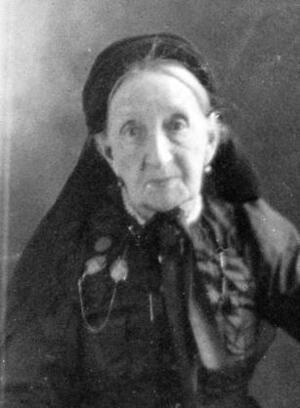Elizabeth D. A. Cohen
Doctor Elizabeth D.A. Cohen (1820-1921).
From the National Library of Medicine.
Elizabeth D. A. Cohen was the first woman doctor recognized by the state of Louisiana and battled to save patients from two epidemics of yellow fever. Cohen’s desire to become a doctor came from losing her young son to measles and feeling more could have been done to save him. When her husband began his studies as a surgeon in New Orleans in 1853, Cohen joined the first women’s medical school, Philadelphia College of Medicine. While the city directory did not list her profession as doctor until 1867, Cohen ran a thriving private practice and worked alongside male doctors during epidemics and other emergencies. She focused her practice on women and children. Cohen outlived her husband and children, living until the age of 101.
“Insert M.D. after her name.” This annotation to the 1888 admission records of Touro Infirmary illustrates the thirty-year struggle of the first woman physician in Louisiana to be recognized as an equal by her male colleagues.
Early Life and Education
Elizabeth D. A. Cohen was born on February 22, 1820, in New York City. Her parents, David and Phoebe Magnus Cohen, were of British descent. She was educated in New York City, where she met and married Aaron Cohen, a doctor, and gave birth to five children. According to interviews in the New Orleans Times-Picayune, the turning point in her life came when her young son died of measles. Elizabeth Cohen felt more could have been done to save the child and determined to “become a doctor myself and help mothers to keep their little ones well.” When her husband moved to New Orleans to study surgery in 1853, the thirty-three-year-old Elizabeth Cohen took a daring step: She enrolled in the Philadelphia College of Medicine, the first women’s medical school in the United States.
Diploma in hand, Elizabeth Cohen arrived in New Orleans in 1857, having distinguished herself by graduating fifth in a class of thirty-six. She became the fourteenth physician and the first woman to practice in Louisiana.
Career and Legacy
Cohen was interviewed for the New Orleans Times-Picayune daily newspaper twice in her long life, when she was ninety-three and on her hundredth birthday. Each time, “looking back through memory’s haze,” she praised the male doctors of her youth for accepting women practitioners without antagonism. “I worked with the doctors of those days through two epidemics of yellow fever, one in the year 1857 and one in [1878]. I attended to families through generations, and often the girl at whose coming into the world I had assisted, when grown to womanhood would engage me for a similar function.” In truth, Cohen’s practice was mostly limited to women and children, and the city directory listed her as a midwife through the year 1867. In 1869, she was listed as a “doctress,” and in 1876, nearly twenty years after her arrival in New Orleans, she was finally listed as a physician.
Widowed and alone after the death of her children, Cohen retired from practice in 1887 and entered Touro Infirmary in February 1888, as a resident of their Department of the Aged and Infirm, later called the Julius Weis Home for the Aged. She became a volunteer for the hospital, caring for the sewing and linen room. Her interest in current events and women’s rights was evident even in old age. “I’m glad to see the girls of today getting an education. In my youth you had to fight for it. And I believe in suffrage, too—things will be better when women can vote and can protect their own property and their own children. Even if I am a hundred, I’m for votes for women.”
Although no overt displays of Judaism are evident in what is known of her life, her adherence to her faith is clear in her choice of retirement residence, and in her own words to her brother, written in 1902: “I am not sure what I will have in the hereafter, so I am trying to enjoy what is given to me here … I am … trying my very best to be good according to my ideas of goodness—that is to live in the fear of God and keeping his ten commandments.”
Elizabeth Cohen died on May 28, 1921, and was buried in Gates of Prayer Cemetery on Canal Street. She left her estate to the Julius Weis Home for the Aged.
Blackmar, Mrs. K.K. “New Orleans First Woman Doctor.” New Orleans Daily Picayune, January 26, 1913.
Duffy, John, ed. The Rudolph Matas History of Medicine in Louisiana (1962).
O’Brien, Sharon, ed. “The Attic Letters of Elizabeth D. A. Cohen, M. D.” Tourovues: The Magazine of Touro Infirmary (Summer 1977).
Samuels, Marguerite. “Woman Doctor Celebrates Her 100th Birthday.” New Orleans Times-Picayune, February 22, 1920.



